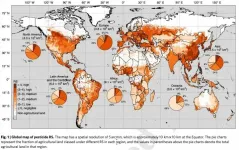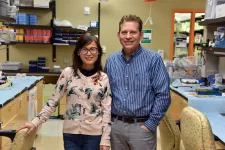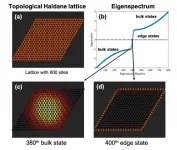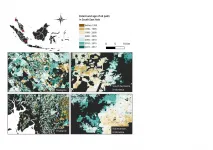64% of global agricultural land at risk of pesticide pollution?
Asia and Europe revealed as having regions at high-risk of pesticide pollution
2021-03-30
(Press-News.org) The study, published in Nature Geoscience, produced a global model mapping pollution risk caused by 92 chemicals commonly used in agricultural pesticides in 168 countries.
The study examined risk to soil, the atmosphere, and surface and ground water.
The map also revealed Asia houses the largest land areas at high risk of pollution, with China, Japan, Malaysia, and the Philippines at highest risk. Some of these areas are considered "food bowl" nations, feeding a large portion of the world's population.
University of Sydney Research Associate and the study's lead author, Dr Fiona Tang, said the widespread use of pesticides in agriculture - while boosting productivity - could have potential implications for the environment, human and animal health.
"Our study has revealed 64 percent of the world's arable land is at risk of pesticide pollution. This is important because the wider scientific literature has found that pesticide pollution can have adverse impacts on human health and the environment," said Dr Tang.
Pesticides can be transported to surface waters and groundwater through runoff and infiltration, polluting water bodies, thereby reducing the usability of water resources.
"Although the agricultural land in Oceania shows the lowest pesticide pollution risk, Australia's Murray-Darling basin is considered a high-concern region both due to its water scarcity issues, and its high biodiversity," said co-author Associate Professor Federico Maggi from the School of Civil Engineering and the Sydney Institute of Agriculture.
"Globally, our work shows that 34 percent of the high-risk areas are in high-biodiversity regions, 19 percent in low-and lower-middle-income nations and five percent in water-scarce areas," said Dr Tang.
There is concern that overuse of pesticides will tip the balance, destabilise ecosystems and degrade the quality of water sources that humans and animals rely on to survive.
The future outlook
Global pesticide use is expected to increase as the global population heads towards an expected 8.5 billion by 2030.
"In a warmer climate, as the global population grows, the use of pesticides is expected to increase to combat the possible rise in pest invasions and to feed more people," said Associate Professor Maggi.
Dr Tang said: "Although protecting food production is essential for human development, reducing pesticide pollution is equivalently crucial to protect the biodiversity that maintains soil health and functions, contributing towards food security."
Co-author Professor Alex McBratney, Director of the Sydney Institute of Agriculture at the University of Sydney, said: "This study shows it will be important to carefully monitor residues on an annual basis to detect trends in order to manage and mitigate risks from pesticide use."
"We recommend a global strategy to transition towards a sustainable, global agricultural model that reduces food wastage while reducing the use of pesticides," said the authors of the paper.
INFORMATION:
DISCLOSURE:
This research was supported by the University of Sydney's EnviroSphere research program. =The authors have no conflicts of interest to declare
[Attachments] See images for this press release:

ELSE PRESS RELEASES FROM THIS DATE:
2021-03-30
The latest gene editing technology, prime editing, expands the "genetic toolbox" for more precisely creating disease models and correcting genetic problems, scientists say.
In only the second published study of prime editing's use in a mouse model, Medical College of Georgia scientists report prime editing and traditional CRISPR both successfully shut down a gene involved in the differentiation of smooth muscle cells, which help give strength and movement to organs and blood vessels.
However, prime editing snips only a single strand of the double-stranded DNA. CRISPR makes double-strand cuts, which can be lethal to cells, and produces unintended edits at both the work site as well as randomly across the genome, ...
2021-03-30
HANOVER, N.H. - March 30, 2021 - Cyanobacteria living at the bottom of lakes may hold important, under-researched clues about the threat posed by these harmful organisms, according to a Dartmouth-led study.
The research, published in the Journal of Plankton Research, urges a more comprehensive approach to cyanobacteria studies in order to manage the dangerous blooms during a time of global climate change.
"Most studies of cyanobacteria focus on the times when they are visible in the water column," said Kathryn Cottingham, the Dartmouth Professor in the Arts and ...
2021-03-30
As our planet warms, seas rise and catastrophic weather events become more frequent, action on climate change has never been more important. But how do you convince people who still don't believe that humans contribute to the warming climate?
New UBC research may offer some insight, examining biases towards climate information and offering tools to overcome these and communicate climate change more effectively.
Researchers examined 44 studies conducted over the past five years on the attentional and perceptual biases of climate change - the tendency to pay special attention to or perceive particular aspects of climate change. They identified a number of ...
2021-03-30
UNIVERSITY PARK, Pa. -- A reproducibility crisis is ongoing in scientific research, where many studies may be difficult or impossible to replicate and thereby validate, especially when the study involves a very large sample size. For example, to evaluate the validity of a high-throughput genetic study's findings scientists must be able to replicate the study and achieve the same results. Now researchers at Penn State and the University of Minnesota have developed a statistical tool that can accurately estimate the replicability of a study, thus eliminating the need to duplicate the work and effectively ...
2021-03-30
In a joint effort, researchers from the Humboldt-Universität (Berlin), the Max Born Institute (Berlin) and the University of Central Florida (USA), have revealed the necessary conditions for the robust transport of entangled states of two-photon light in photonic topological insulators, paving the way the towards noise-resistant transport of quantum information. The results have appeared in Nature Communications.
Originally discovered in condensed matter systems, topological insulators are two-dimensional materials that support scattering-free (uni-directional) transport along their edges, even in the presence of defects and disorder. In ...
2021-03-30
IIASA researchers have used Sentinel 1 satellite imagery from the European Space Agency to produce a map of the extent and year of detection of oil palm plantations in Indonesia, Malaysia, and Thailand that will help policymakers and other stakeholders understand trends in oil palm expansion while also providing an accurate map for landscape-level planning.
The world's appetite for palm oil seems to know no bounds. We use it in everything from beauty products and food, to industrial processes and biofuels to fulfill our energy needs. This ever growing demand has caused oil palm production to more than double in the last two decades, a development which has in turn deeply impacted natural forest ecosystems and biodiversity, while also significantly ...
2021-03-30
One in four Germans suffers from metabolic syndrome. Several of four diseases of affluence occur at the same time in this 'deadly quartet': obesity, high blood pressure, lipid metabolism disorder and diabetes mellitus. Each of these is a risk factor for severe cardiovascular conditions, such as heart attack and stroke. Treatment aims to help patients lose weight and normalise their lipid and carbohydrate metabolism and blood pressure. In addition to exercise, doctors prescribe a low-calorie and healthy diet. Medication is often also required. However, it is not fully clear ...
2021-03-30
Researchers at KU Leuven (Belgium) have succeeded for the first time in measuring brain waves directly via a cochlear implant. These brainwaves indicate in an objective way how good or bad a person's hearing is. The research results are important for the further development of smart hearing aids.
A cochlear implant enables people with severe hearing loss to hear again. An audiologist adjusts the device based on the user's input, but this is not always easy. Think of children who are born deaf or elderly people with dementia. They have more difficulty assessing and communicating ...
2021-03-30
Artificial Intelligence is now capable of generating novel, functionally active proteins, thanks to recently published work by researchers from Chalmers University of Technology, Sweden.
"What we are now able to demonstrate offers fantastic potential for a number of future applications, such as faster and more cost-efficient development of protein-based drugs," says Aleksej Zelezniak, Associate Professor at the Department of Biology and Biological Engineering at Chalmers.
Proteins are large, complex molecules that play a crucial role in all living cells, building, modifying, and breaking down other molecules naturally inside our cells. They are also widely used in industrial processes and products, and in our daily lives.
Protein-based drugs are very common - the diabetes drug ...
2021-03-30
Working with fruit flies, scientists at Johns Hopkins Medicine say they have identified a new molecular pathway that helps steer moving cells in specific directions. The set of interconnected proteins and enzymes in the pathway act as steering and rudder components that drive cells toward an "intended" rather than random destination, they say.
In a report on the work, published March 2 in Cell Reports, these same molecular pathways, say the scientists, may drive cancer cells to metastasize or travel to distant areas of the body and may also be important for understanding how cells assemble and migrate in an embryo to form organs and other structures.
The team of scientists was led by Deborah Andrew, Ph.D., professor of cell biology and associate director for faculty development for ...
LAST 30 PRESS RELEASES:
[Press-News.org] 64% of global agricultural land at risk of pesticide pollution?
Asia and Europe revealed as having regions at high-risk of pesticide pollution






